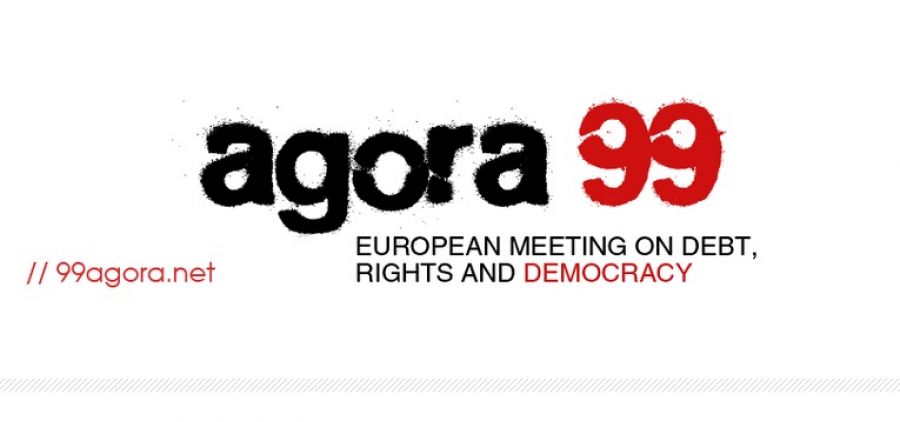Verso Agorà 99 – [eng] Contributo al workshop UNIVERSITY: EDUCATION, RESEARCH AND PRECARITY
 During the last two years, Italian universities have gone through a process of reform – what is known as “Gelmini reform”.
During the last two years, Italian universities have gone through a process of reform – what is known as “Gelmini reform”.
The point here is not to go through a deep analysis of such reform as a whole, since it has assumed – and still is assuming – very different forms depending on the Universities and cities. We also know this has been a major theme of reflection among italian movements.
We would like instead to talk about what this process means as far as our experience in Pisa is concerned, how it influences our presence into the University and our approach to struggles both inside University and in our town.One major effect of such reform has been the polarization between more centralized political and technical organs on the one hand, and organs closer to teaching and students – recall that the so-called “faculties” (the organs responsible for teaching) have been unified with “departments” (those responsible for research). This means an overall restriction of spaces and occasions in which students could directly take part into decisions regarding their own presence in the University, such as course syllabuses and academic calendar.
At the same time we have seen a continuous trend of cuts to funding for teaching, research and student welfare such as accommodation, canteens, scholarships.
In Pisa, the dismissal of the public University have been carried on by a peculiar coalition between the University and the local administration.
First, the University cannot afford to mantain a number of high-valued buildings any more, on which the local administration (or even private investors) is speculating – basically, the hope is to acquire them underprice and then sell to privates. At the same time, those historical locations – placed in the city centre – have been substituted by a series of University structures built at the edge of town. This process forces students to be spread around the town, preventing the possibility of meeting and interacting outside the limited time spent following classes. For the University, this has the advantage to keep under control possible self-organized experiences through an increasing fragmentation. For the local administration, pushing students outside downtown means a more ordered, clean, empty center ready for tourists and visitors. Actually, this transforms a vital, populated city into a dead, empty showcase – a terrific (and terrible!) illustration of what they mean by “security” and “order”. Our security is the presence of life and bodies, rather than a bunch of security cameras at the corner of dark and lonely streets.
In Pisa, we have entire areas, up to a few years ago populated by dozen of students, full of bars and shops, that are nowadays empty and neglected.
Besides this intimate connection between dismission of the University, property speculation, and the imposition of a strict control over student presence in town, we believe that is worth to spend a word on how different mechanisms are operating inside the University itself.
Faculties of Humanities underwent a simpler, more straight dismission: less courses, badly organized and lacking of proper information, are by now every-day experience. This corresponds to a restricted availability of research and staff position inside the University, as well as an increasing difficulty to find a proper job outside.
Faculties of Science are a different story. Subjects like Physics, Engineering, Economics, fit better the need of markets for the kind of working force they furnish. So here a complete dismission would not be so convenient. The strategy is then different.
We assist to a massive campaign promoting what they call “merit” and “promotion of excellence”. Let us spend a word on this.
We believe that learning is a complex and non linear process. Above all, let us stress that it is a collective experience – we learn and grow if we are stimulated by discussion, knowledge sharing , if we are exposed to errors we can correct, if deviations and accidents can occurr and be faced. Knowledge is part of what we call “commonwealth”, and so are “excellence” and “merit” – there exist no excellence without condivision, excellence is not the individualistic experience of a student forced to work and produce alone, but rather it’s a collective experience.
As such, it doesn’t make any sense to decline the concept of “merit” in a competitive fashion, as if one were “excellent” not if he/she does well, but if he/she did better than someone else.
Instead, the campaign on merit serves the goal of a depletion of the standard, broadly-accessible University. Within a system that invests in teaching, welfare, scholarhsips based on income, those who couldn’t afford to study and live away from home could find their way. Quite on the contrary, an ideologic and competitive approach to merit allows to legitimate a higly selective mechanism, through which resources are put into very few, exclusive schools or faculties that are accessible to few and few people. In most cases, this lead those who come from upper-class, well-educated families to be favourite with respect to those who rely on public education only, which is becoming increasingly poor. We believe this to be part of a process in which a restricted, class-selected elite is well educated within the logic of merit, competition and productivity to become the future source of managers and governors, while the rest serves as a base of lower-skill manpower, excluded from decision-making processs at any level, more espoused to exploitation and restriction of rights. In this sense, the University has become fully embedded in a more general process of evolution of modern capitalism, which tends to evolve in the direction of an effective extorsion of skills and life-time starting from every-day life. The recent reforms are a net step in this direction.
This overall picture forces movements that are present inside Universities to update their approach.
First, the connection between re-organization of Universities and an attack to the role and presence of students in town – mainly on the side of welfare-, as well as the cuts to lodging and increasing prices for rents, leads us to consider any claim for income and welfare no more as a theme complementary to our presence inside Universities, but rather as something that is fully part of our analysis and perspectives. Hence, the theme of occupying houses should assume (and in fact has) a leading role in Italy, and has seen a renovated connection between workers, unemployed, migrants and students, as the great demonstration of October 19th in Rome has witnessed.
Second, we wish to emphasize that a strong and well-posed attack to the theme of “merit” and to the general abandon of a broadly accessible University has to find forms that fit the current situation.
We don’t believe in a generic quest for “more resources” or in simple complaints about the situation, either posed inside representative organs or claimed from outside with stronger demonstrations of discontent (that by the way are welcome, if carried on in a clever way). We neither have some more reforms to oppose, since the last one is already effective. We rather think that we have to challenge the University on its own territory with a direct subtraction of spaces to negligence and speculation. This means that of course occupations play a central role in our activities both inside and outside Universities. This is what we have recently done in Pisa with the occupation of some unused spaces inside the Department of Mathematics.
But this is not the end of the story – to have physical space is not enough. By “attack” to the concept of merit we mean to fill our spaces with activities that realise in fact what we have just said about the meaning of this word. We need to build experiences that act against the blind exploitation of resources, bodies and brains which governs our lifes – that are able to affect our every-day experience inside Universities. This practically means to give to students physical space to meet, talk, study or simply spend time together, against the logic that pretends to separate some few “excellences” from other students, and according to which such excellence would be to shut up and remember what an old professor has to say to you well enough to vomit it back during the final examination. The same concept of excellence that pushes people not to grow together in a collective path, but to step on each other corpses to reach the top.
Against this we construct moments of debate and book presentations, we offer people a space free of control and, above all, we are able to show a concrete alternative inside the University and to plan here what we wish will become a larger programme of occupations in town.
One final argument we wish to mention is self-education, which is also a major task of ourselves. In the framework of this polarization between excellence and a general dismissal of public University, self-organized processes of learning assume a crucial role against the fragmentaiton and exclusion of students from decisional processes. In this sense, this has become much more than a “quest for independence” in people’s studies, as well as more than a way to attack the system of credits of the Bologna process. This is the actual way in which excellence is produced. Since knowlege is “commonwealth”, than there can’t exist any excellence in a single person. Excellence is collective, it can only be. Let’s fight to achieve ours.

